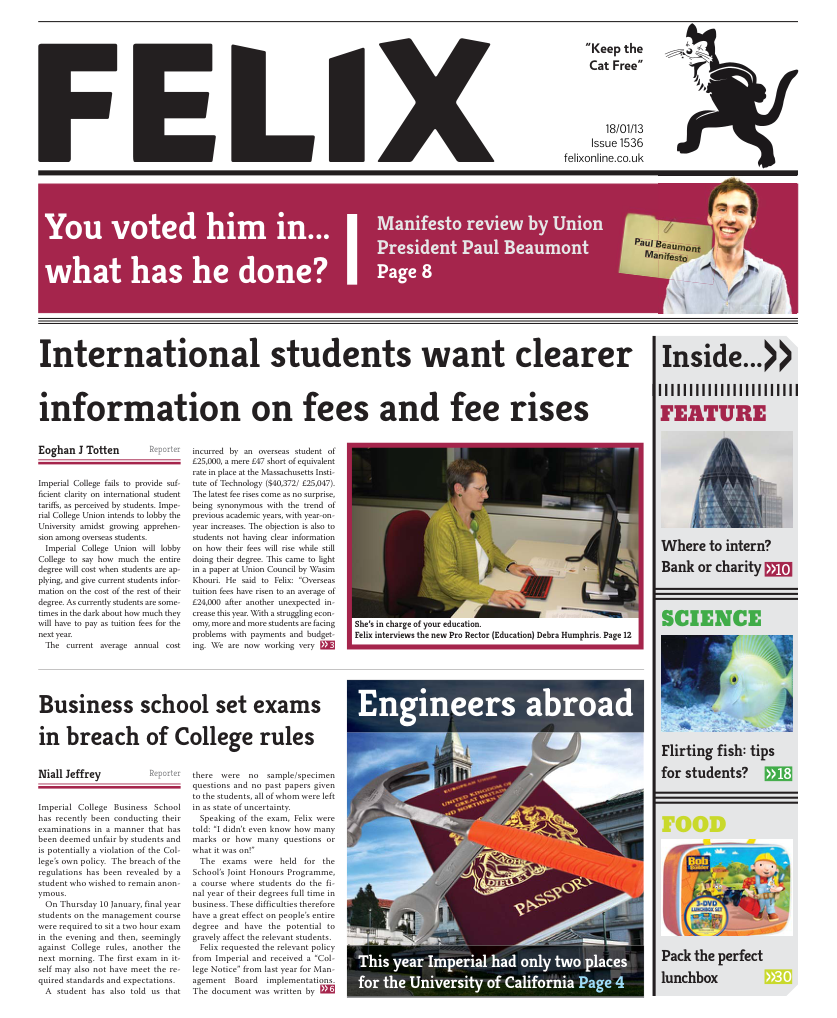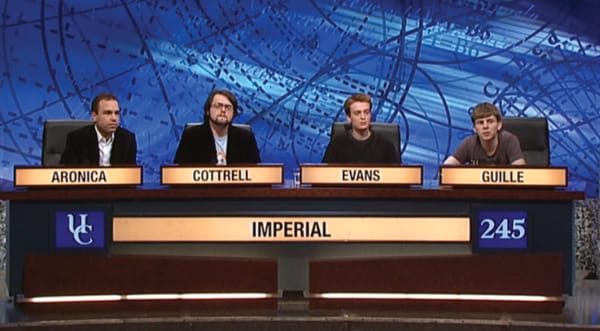A long term strategist
Tim Arbabzadah interviews the new Pro-Rector (Education) Debra Humphris

Tim Arbabzadah: Does your background help you in your current role? Did you gain – I hate this word – transferrable skills?
Debra Humphris: It keeps me fairly grounded in what we’re trying to achieve. Universities are extraordinary institutions and Imperial is definitely one of the best. Not just in terms of the amazing research that we do that transforms peoples lives, but the education and the whole experience that equally transforms the lives of our students. There’s nothing more satisfying for me than seeing students flourish. We should give them an outstanding experience, and just set them off to do amazing things in life and society.
TA: You’ve only just come in, so I guess is one of your aims to start meeting student reps so they know that right up at the top there is someone that they know?
DH: Of course, I met with Doug [Hunt, Deputy President (Education] Becky [Lane, Deputy President (Welfare)] and Paul [Beaumont, Union President] before I took up post. For me the Student Union is a really important part of the wider student experience, and how we work in partnership is really matters. As part of my background research on the College I read the 2011 NSS Response, it was a really helpful insight on the issues that matter to our students. Recently I’ve worked with Paul and Doug on the 2012 report. We had some interesting conversations to make sure it’s absolutely accurate, because it wouldn’t help anybody if it wasn’t accurate. It’s a really helpful way to focus on the key areas where we can enhance the education and student experience, but we won’t be able to do it all at once. The outgoing graduates who complete the NSS in 2013 might have very different views from the previous cohorts, but there will always be improvements we can make. My normal modus operandi is that my job is education and student experience, and therefore I need to be close to the student body, listening to their views, being accessible to students for me is really important.
TA: Some students may feel a bit intimidated talking to a higher up person and attempt to act in a different way around you. Would you rather a warts and all portrayal of modern student life?
DH: I remember at my interview when asked about what my style was I said “what you see is what you get”. I would rather students felt able to have a very straightforward conversation with me, because I can’t see the point of doing anything otherwise, it’s far better that we’re frank and open with each other.
TA: What do you think the internet’s role is? Is there a big challenge in using the internet effectively rather than just because you can?
DH: There are a number of universities around the world who have taken significant steps to open up online resources. Most notable is Edx started by Harvard and MIT with others now joining. What I have been exploring with colleagues is that we have’digital natives’ coming through in terms of students for whom technology is normal. The question now is how then do we combine that in the most effective way to enhance the educational experience. I’m also very interested in where we as Imperial want to position ourselves in terms of that online community. In February I’m bringing a group of people together internally as part of a strategy development process to consider why and what we want to do about this. There’s no doubt we could do more and but first we need to be clear about our strategy for that? I’d be quite keen to explore how we might use some of our online resources to better encourage young people in secondary schools to engage with science, technology and maths.
TA: A lot of universities get lambasted for not doing enough for outreach to get people into university? What is the universities place in this? Or would you say that the Government unfairly point the blame at the universities for a school system that is their jurisdiction?
DH: With the change to tuition fees for Home/EU undergraduate students the Office of Fair Access (OFFA) has required us in our access agreement to make clear how we make additional investment in student support and outreach activities. As tuition fee income increases so the grant from the Higher Education Funding Council for England (HEFCE ) is reducing, So we’re using investing more in outreach, we can’t do everything so we have to be really quite strategic and focused on what makes a difference.
There’s one thing about encouraging young people to consider higher education, but it’s another thing to encourage them to apply to Imperial.
Our outreach team does great work; we’ve got some great developments such as Reach Out Lab and the number of schools that they engage with. We’re at a point where we probably need to take stock and review where we can most effectively focus our efforts.
TA: At Imperial, Departments are quite autonomous. Would you say the way forward is making things uniform across all Departments? Or is it a better approach to look at departments individually?
DH: Well in terms of education we also have to operate within the framework of the Quality Assurance Agency Quality Code, and one of the issues this raises is how we ensure parity of experience. There will be disciplinary differences: chemistry is not the same as mechanical engineering. Where we’ve made a commitment to students in our quality framework and in our regulations we need to ensure we deliver our commitments.
Feedback has always been the one that people highlight, not just at Imperial. In terms of assessment and feedback I think there’s a bigger issue around what’s feedback, how do you know you’re getting feedback? What does feedback look like? Helping students understand what that really means. And in terms of assessment, I suspect that we need to think about and really understand the purpose of assessment. What does the assessment look like? I would hazard a guess that there are areas in which we might be over assessing students for whatever reason. If we really want to focus on assessment and feedback we need to think about what constitutes assessment. When do we need to assess? What are we assessing in terms of the learning outcomes for particular courses?
TA: The difficulty, in my view, with making everything standardised involves chasing up and ensuring every lecturer does something to a perfect standard?
DH: In reality there is variation in all things, we are all somewhere in a range in a distribution curve. But I go back to the point that it’s about being clear about what feedback is and signalling that very clearly to students. If we’ve made a promise about when we’ll give you feedback then we need to keep our promises. Still there’s a bigger issue about what is assessment, how are we assessing, what assessment do we actually need to do. There’s a bigger piece of work to do on this.
TA: Are these sorts of issues that you’re taking a back to square one approach, rather than building on current framework? Maybe thinking: perhaps let’s dismantle and put the framework back together again?
DH: With the support of the Management Board in the next 6 months I’ll be taking forward a process to refresh and refine an education and student experience strategy. There will be a range of provocations that will invite students and staff to contribute going to a whole set of elements that should shape our strategy. This has to build upon the great education and experience we offer and to take it further. As part of the process I’ll be encouraging us all to look up and out to consider best practice from across the globe. Once we’ve decided what we want to do it strikes me that Imperial will do it with gusto!
My strategy is to take forward a conversation across the College to develop a strategy that engages the genius of the staff and students in the College. The focus is the education and wider student experience and everybody should have a voice in this process.
TA: Last question. So would you say that the educational experience of a student can improve a student’s satisfaction and welfare as a whole? Do you think the educational experience is a stem to their general enjoyment of university?
DH: Well, students fundamentally come to the university to take part in an educational experience to receive an award from the institution. That’s not just the educational experience; it included the wider support that is in place: the accommodation, the catering, the sports and recreation, volunteering, careers advice, disability service etc. There are a whole range of elements that are there to support and help students to not just on their programme but in the wider experience as a student. I’m interested in the rounded genius of our students, because it’s more than just their programme. It’s the students that take part in volunteering, get involved in outreach in schools, sports, fund raising and the other elements. That’s the rounded genius of our students and I really like to work with the Union and students to find a way to further enhance such opportunities.










